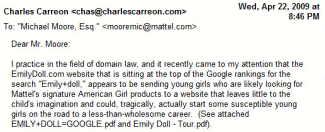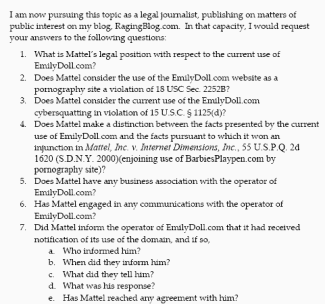03/17/09
The Case for Paying Out Bonuses at A.I.G.
By ANDREW ROSS SORKIN
Published: March 16, 2009
Do we really have to foot the bill for those bonuses at the American International Group?
It sure does sting. A staggering $165 million — for employees of a company that nearly took down the financial system. And heck, we, the taxpayers, own nearly 80 percent of A.I.G.
It doesn’t seem fair.
So here is a sobering thought: Maybe we have to swallow hard and pay up, partly for our own good. I can hear the howls already, so let me explain.
Everyone from President Obama down seems outraged by this. The president suggested on Monday that we just tear up those bonus contracts. He told the Treasury secretary, Timothy F. Geithner, to use every legal means to recoup taxpayers’ money. Hard to argue there.
“This isn’t just a matter of dollars and cents,” he said. “It’s about our fundamental values.”
On that last issue, lawyers, Wall Street types and compensation consultants agree with the president. But from their point of view, the “fundamental value” in question here is the sanctity of contracts.
That may strike many people as a bit of convenient legalese, but maybe there is something to it. If you think this economy is a mess now, imagine what it would look like if the business community started to worry that the government would start abrogating contracts left and right.
As much as we might want to void those A.I.G. pay contracts, Pearl Meyer, a compensation consultant at Steven Hall & Partners, says it would put American business on a worse slippery slope than it already is. Business agreements of other companies that have taken taxpayer money might fall into question. Even companies that have not turned to Washington might seize the opportunity to break inconvenient contracts.
If government officials were to break the contracts, they would be “breaking a bond,” Ms. Meyer says. “They are raising a whole new question about the trust and commitment organizations have to their employees.” (The auto industry unions are facing a similar issue — but the big difference is that there is a negotiation; no one is unilaterally tearing up contracts.)
But what about the commitment to taxpayers? Here is the second, perhaps more sobering thought: A.I.G. built this bomb, and it may be the only outfit that really knows how to defuse it.
A.I.G. employees concocted complex derivatives that then wormed their way through the global financial system. If they leave — the buzz on Wall Street is that some have, and more are ready to — they might simply turn around and trade against A.I.G.’s book. Why not? They know how bad it is. They built it.
So as unpalatable as it seems, taxpayers need to keep some of these brainiacs in their seats, if only to prevent them from turning against the company. In the end, we may actually be better off if they can figure out how to unwind these tricky investments.
Not that any of this takes the bite out of paying these bonuses. For better or worse — in this case, worse — someone at A.I.G. decided this company needed to sign bonus agreements last year to keep people before the full extent of its problems became clear.
Now we can debate why A.I.G. felt it necessary to guarantee seven executives at least $3 million apiece when the economy was clearly on shaky ground. Perhaps we will find out these contracts were a bit of sleight of hand to enrich executives who knew this financial Titanic had hit the iceberg. But another possible explanation is that A.I.G. knew it needed to keep its people.
That is the explanation offered by Edward M. Liddy, who was installed as A.I.G.’s chief executive when the government effectively nationalized the company last fall. (He is being paid $1 a year.)
“We cannot attract and retain the best and brightest talent to lead and staff” the company “if employees believe that their compensation is subject to continued and arbitrary adjustment by the U.S. Treasury,” he said.
There’s some truth to what Mr. Liddy is saying. Would you want to work at A.I.G.? Sure, maybe for $3 million. But not if you could go somewhere else for even more — or even much less.
“The jobs are terrible,” said Robert M. Sedgwick, an executive compensation lawyer at Morrison Cohen who represents a number of employees of banks that have taken government money. “You have to read about yourself in the paper every day. These people are leaving as soon as they can.”
Let them leave, you say. Where would they go, given the troubles in the financial industry? But the fact is, the real moneymakers in finance always have a place to go. You can bet that someone would scoop up the talent from A.I.G. and, quite possibly, put it to work — against taxpayers’ interests.
“The word on the street is that A.I.G. employees are being heavily recruited,” Ms. Meyer says.
Of course, if taxpayers had not bailed out A.I.G., these contracts would not be worth anything. Andrew M. Cuomo, the attorney general of New York, made the point on Monday, when he subpoenaed A.I.G. for the names of the people who received the bonuses. If A.I.G. had spiraled into bankruptcy, its employees would have had to get in line with other unsecured creditors.
Mr. Cuomo wants to know who A.I.G.’s lucky employees are, and how they have been doing at their jobs. So here is a suggestion for him. Get the list, and give those big earners at A.I.G. a not-so-subtle nudge: Perhaps they will “volunteer” to give some of their bonuses back or watch their names hit the newspapers. But in the meantime, despite how offensive and painful it might be, let’s honor the contracts.
With his article The Case for Paying Out Bonuses at A.I.G. , New York Times financial columnist Andrew Sorkin elicited my ire. I actually wrote him an email, and you can do likewise at this link. Or you can just read my strident reply below, that quotes the salient points of his meritless arguments, and tell him you agree with Charles Carreon.

New York Times Financial columnist Andrew Ross Sorkin apologist for AIG
1. “This isn’t just a matter of dollars and cents,” he said. “It’s about our fundamental values.” *** the “fundamental value” in question here is the sanctity of contracts. ***If government officials were to break the contracts, they would be “breaking a bond,” Ms. Meyer says.
Contracts are only sacred if they are entered into voluntarily with full understanding of their consequences. The anger of the public is not “buyer’s remorse;” rather, it is justified rebellion against having terms imposed upon them by an AIG management that obtained money under false pretenses and used it for purposes that, if fully known, neither Congress nor the voters would have agreed to. Therefore, these contracts are voidable because of a defect in their formation, i.e., fraud or a mistake as to material terms known exclusively to one party – AIG.
2. A.I.G. built this bomb, and it may be the only outfit that really knows how to defuse it.
“prevent them from turning against the company. In the end, we may actually be better off if they can figure out how to unwind these tricky investments.”
This contention is downright silly. Nothing is being “unwound.” AIG has just been paying off its “counterparties,” and in many cases, according to the New York Times, under circumstances where nothing was due under the “Credit Default Swap” insurance policies that AIG had issued. This is insurance malpractice, if you think about it – as if my insurance company gave me a check for the value of my wrecked vehicle because their statistics suggested I was likely to have a wreck someday. These people “turned against the company” long ago by digging the financial hole it is now in. They need to be turned out of their offices by any means less drastic that actual defenestration.
3. A.I.G. knew it needed to keep its people.
“We cannot attract and retain the best and brightest talent to lead and staff” the company “if employees believe that their compensation is subject to continued and arbitrary adjustment by the U.S. Treasury,” he said.
Excuse me, but funding the operation of AIG provided these bonus-grabbers with a subsidy for salaries that would simply have evaporated in insolvency. Being subsidized is not being subjected to “continued and arbitrary adjustment.” Your uncritical repetition of this bilge is bizarre. Since when did the New York Times turn “garbage in, garbage out” into a journalistic maxim?
4. [T]he real moneymakers in finance always have a place to go. You can bet that someone would scoop up the talent from A.I.G. and, quite possibly, put it to work — against taxpayers’ interests.
The “real moneymakers” seems like a strange definition for people who lost billions of other people’s money. Perhaps you could get a job as a meaning distorter for Fox News.
1. Perhaps they will “volunteer” to give some of their bonuses back or watch their names hit the newspapers. But in the meantime, despite how offensive and painful it might be, let’s honor the contracts.
Are you deranged? Your solicitousness toward these robber barons has utterly undermined your credibility as a commentator. You are a handsome man, as depicted on the New York Times website, and thus must come from a good family. If you will send me your email address, I will paypal you a dime, like Prof. Kingsfield in Paper Chase, so you can call your parents and tell them that there is grave doubt you will make a real financial reporter.










